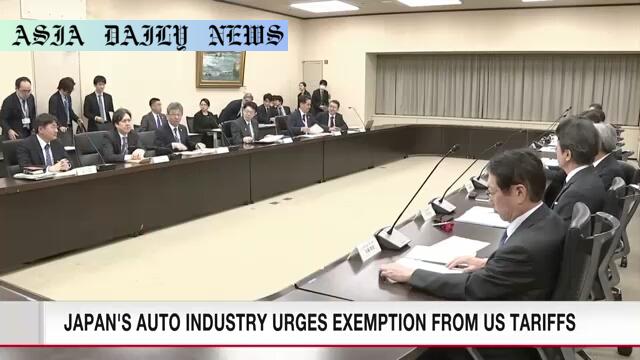Tariffs: Japan’s auto industry seeks exclusion from US import taxes, emphasizing the potential economic impact on both nations.
Japan’s auto industry urges the government to request tariff exemptions from the US for Japanese car imports.
A meeting between Japan’s auto and related industries and government officials discussed severe economic repercussions.
US tariff proposals could impact economic stability and employment in both Japan and the US, particularly in small-scale industries.
Plans are underway for Japan’s Economy Minister to discuss the issue with the US commerce department.

Introduction: US Tariffs and Japan’s Auto Industry
In a move that could significantly impact global trade relations, Japan’s automobile industry association has taken proactive steps to address potential US-imposed tariffs on automobile imports. These tariffs, which could impose a hefty 25% on cars and parts exported from Japan, have sparked concerns not only among Japanese manufacturers but also regarding the broader implications for the US economy.
The Core Issue: Tariff Implications on Japanese Automobiles
The United States, under recent trade policies proposed by President Donald Trump, seeks to impose higher import taxes on a variety of products, including automobiles and related parts. Japan, a significant player in global automobile production, fears that such measures could disrupt the flow of trade and strain economic ties. Industry experts warn that these tariffs could dramatically increase costs, potentially reducing demand and adversely affecting production lines, jobs, and the broader economy.
Japan’s Proactive Response
Recognizing the urgent need to address these challenges, Japan’s Economy, Trade and Industry Minister, Muto Yoji, convened meetings with key representatives from the automobile, steel, and aluminum sectors. These discussions focused on formulating strategies to mitigate the potential fallout of the proposed tariffs. Minister Muto emphasized that the government would take all necessary measures to safeguard Japan’s economic interests, underscoring the automobile sector’s vital role within the country’s economic framework.
Potential Repercussions for Both Economies
Chairman Katayama Masanori of the Japan Automobile Manufacturers Association shared significant concerns regarding the cascading effects of the proposed tariffs. He highlighted that such measures would not only harm Japanese exports but would also reverberate through the US economy. The automotive industry in the US relies heavily on imports for components and finished goods, and increased costs could ripple throughout the supply chain, leading to higher prices for consumers and potential job losses in related industries.
The Concerns of Small and Medium Enterprises
The potential impact on smaller players in the automotive supply chain has also come to the forefront. Representatives from the auto parts industry expressed apprehensions about how steep tariffs would significantly burden smaller and mid-sized enterprises. Many such companies operate on razor-thin margins, and the imposition of tariffs could severely strain their financial viability, leading to job cuts and a decline in local economic growth.
Looking Ahead: Japan’s Diplomatic Strategy
As part of its diplomatic strategy, the Japanese government is making arrangements for Minister Yoji to visit the United States, potentially as early as March, to engage directly with US Secretary of Commerce Howard Lutnick. This meeting is aimed at articulating Japan’s concerns and seeking avenues to exclude Japanese automobiles from the impending tariffs. The Japanese government is keen to emphasize the mutual economic benefits of avoiding such protectionist measures and maintaining free trade agreements.
Conclusion: A Critical Juncture in US-Japan Trade Relations
As global economic powerhouses, Japan and the United States share a longstanding trade relationship that has historically fostered growth and innovation. The current challenges posed by potential tariffs on Japanese automobiles mark a critical juncture that could redefine these ties. Both nations have much to gain from constructive dialogue and collaborative efforts to navigate the complexities of international trade in today’s geopolitical climate. Japan’s proactive measures to address these concerns reflect its commitment to sustaining and strengthening this important relationship.
Commentary
Understanding the Impact of Tariffs
The proposed US tariffs on Japanese automobile imports have reignited conversations about global trade dynamics. While the intention behind such tariffs may be to protect domestic industries, the potential repercussions, as highlighted by Japan’s automobile sector, suggest that the consequences could be far-reaching and counterproductive. By increasing costs for both producers and consumers, these tariffs risk disrupting economic stability not only in Japan but also within the US itself.
The Importance of Collaborative Problem-Solving
Japan’s response to this challenge underscores the significance of proactive diplomacy and collaboration in resolving international trade disputes. By scheduling direct discussions between high-level officials, the Japanese government demonstrates a commitment to addressing the issue constructively. Such efforts highlight the role of dialogue in fostering mutual understanding and averting economic conflicts that could harm both parties.
The Broader Context of Trade Policies
On a broader scale, this situation exemplifies the complexities of modern trade policies. As nations seek to balance domestic interests with global trade commitments, it becomes increasingly important to adopt approaches that prioritize long-term economic health over short-term gains. Japan’s emphasis on avoiding tariffs reflects an understanding of this principle, striving to maintain stability in the interconnected global economy.
Final Thoughts
In conclusion, the discussions surrounding US tariffs on Japanese cars reveal the intricate interplay between policy decisions and economic realities. As efforts to resolve these challenges unfold, it is crucial to recognize the value of cooperation and shared prosperity. Both the US and Japan have an opportunity to set an example for the world by navigating these complexities thoughtfully and ensuring that trade relations continue to promote growth, innovation, and economic well-being on a global scale.


